The Use of Social Media as a Strategic Marketing Platform
VerifiedAdded on 2020/04/01
|61
|16901
|54
Project
AI Summary
This research project proposal, submitted to the London School of Business and Finance, investigates the use of social media as a strategic marketing platform. The proposal outlines the study's aims and objectives, which include identifying the advantages and disadvantages of using social media in marketing, analyzing the most commonly used social media channels, and exploring marketing tips from successful businesses. The study will review the literature on marketing strategy, social media's role in business, and relevant theories such as communication theory and social exchange theory. The methodology includes quantitative analysis, a research plan, and ethical considerations. The project explores the role of social media in marketing, its impact on business, and its distinguishing features. The proposal will also explore the use of social media as a marketing platform for both small and large-scale businesses, with a focus on how businesses are using social media as a marketing tool.
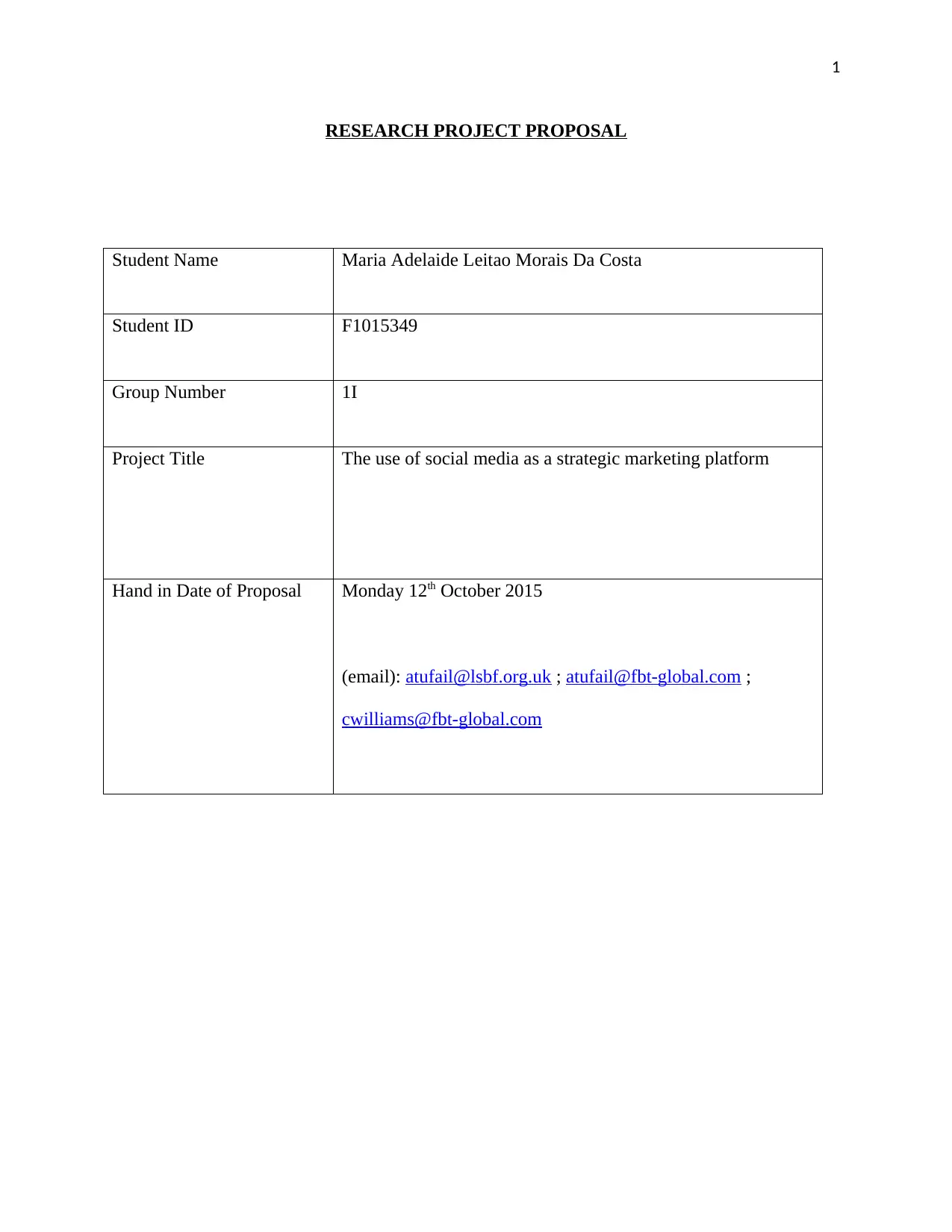
1
RESEARCH PROJECT PROPOSAL
Student Name Maria Adelaide Leitao Morais Da Costa
Student ID F1015349
Group Number 1I
Project Title The use of social media as a strategic marketing platform
Hand in Date of Proposal Monday 12th October 2015
(email): atufail@lsbf.org.uk ; atufail@fbt-global.com ;
cwilliams@fbt-global.com
RESEARCH PROJECT PROPOSAL
Student Name Maria Adelaide Leitao Morais Da Costa
Student ID F1015349
Group Number 1I
Project Title The use of social media as a strategic marketing platform
Hand in Date of Proposal Monday 12th October 2015
(email): atufail@lsbf.org.uk ; atufail@fbt-global.com ;
cwilliams@fbt-global.com
Paraphrase This Document
Need a fresh take? Get an instant paraphrase of this document with our AI Paraphraser
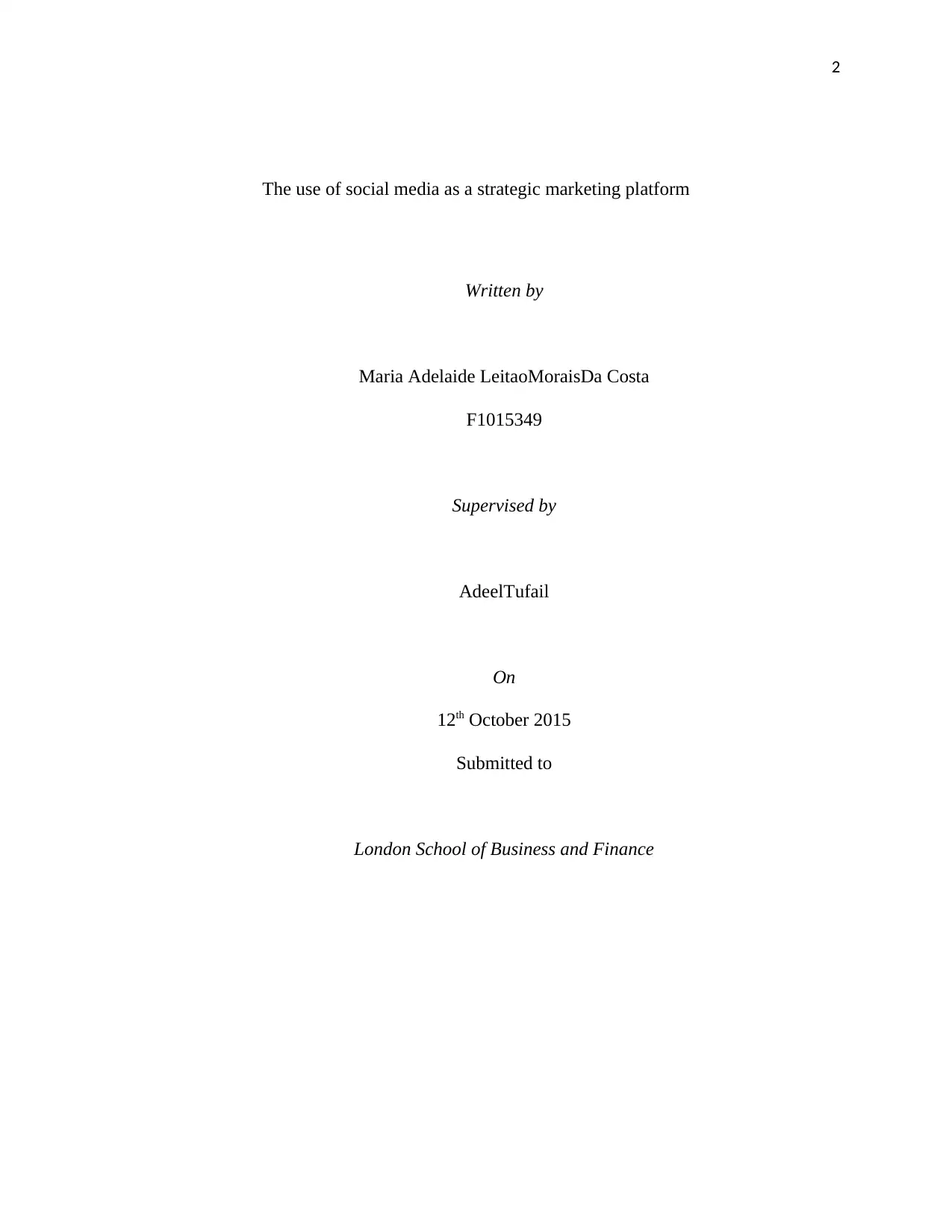
2
The use of social media as a strategic marketing platform
Written by
Maria Adelaide LeitaoMoraisDa Costa
F1015349
Supervised by
AdeelTufail
On
12th October 2015
Submitted to
London School of Business and Finance
The use of social media as a strategic marketing platform
Written by
Maria Adelaide LeitaoMoraisDa Costa
F1015349
Supervised by
AdeelTufail
On
12th October 2015
Submitted to
London School of Business and Finance
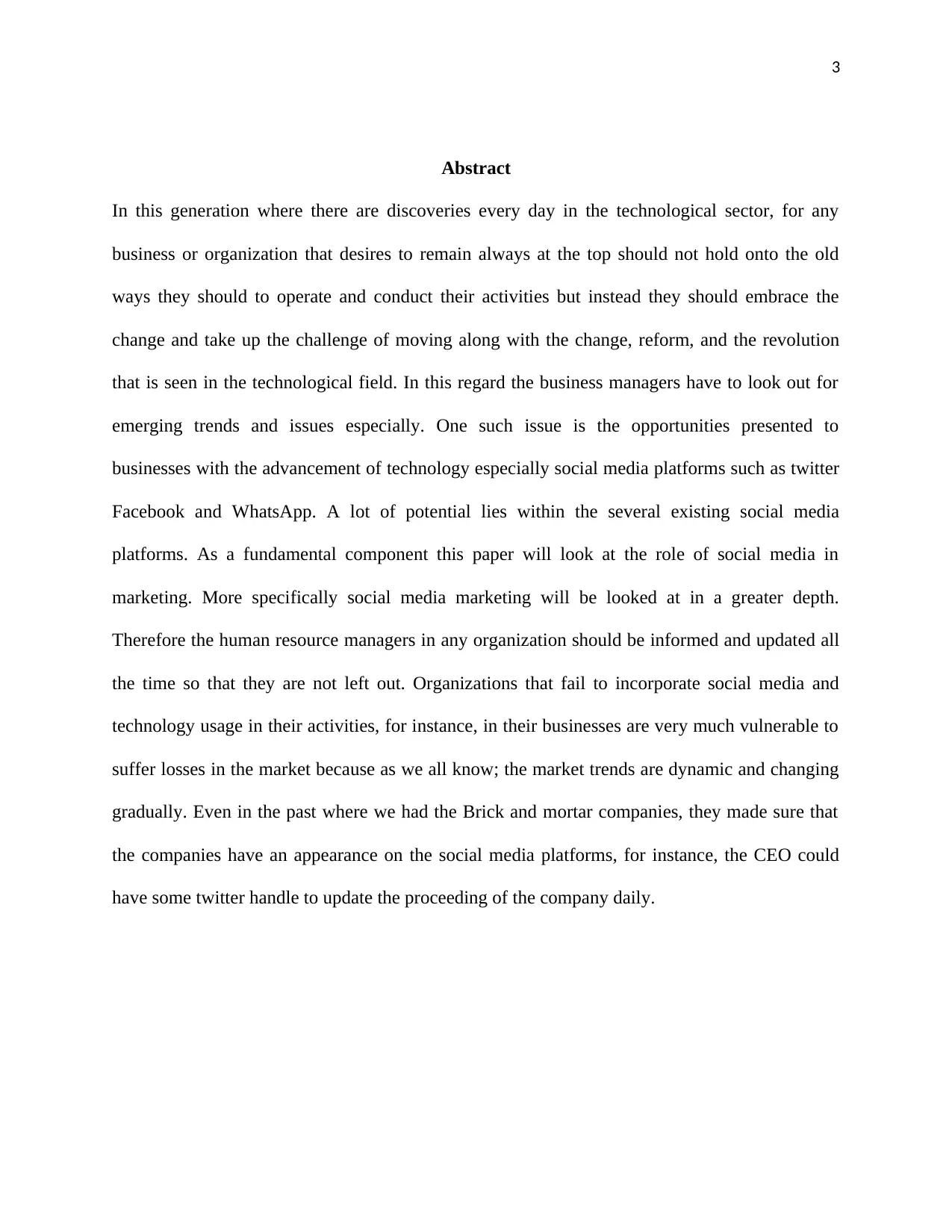
3
Abstract
In this generation where there are discoveries every day in the technological sector, for any
business or organization that desires to remain always at the top should not hold onto the old
ways they should to operate and conduct their activities but instead they should embrace the
change and take up the challenge of moving along with the change, reform, and the revolution
that is seen in the technological field. In this regard the business managers have to look out for
emerging trends and issues especially. One such issue is the opportunities presented to
businesses with the advancement of technology especially social media platforms such as twitter
Facebook and WhatsApp. A lot of potential lies within the several existing social media
platforms. As a fundamental component this paper will look at the role of social media in
marketing. More specifically social media marketing will be looked at in a greater depth.
Therefore the human resource managers in any organization should be informed and updated all
the time so that they are not left out. Organizations that fail to incorporate social media and
technology usage in their activities, for instance, in their businesses are very much vulnerable to
suffer losses in the market because as we all know; the market trends are dynamic and changing
gradually. Even in the past where we had the Brick and mortar companies, they made sure that
the companies have an appearance on the social media platforms, for instance, the CEO could
have some twitter handle to update the proceeding of the company daily.
Abstract
In this generation where there are discoveries every day in the technological sector, for any
business or organization that desires to remain always at the top should not hold onto the old
ways they should to operate and conduct their activities but instead they should embrace the
change and take up the challenge of moving along with the change, reform, and the revolution
that is seen in the technological field. In this regard the business managers have to look out for
emerging trends and issues especially. One such issue is the opportunities presented to
businesses with the advancement of technology especially social media platforms such as twitter
Facebook and WhatsApp. A lot of potential lies within the several existing social media
platforms. As a fundamental component this paper will look at the role of social media in
marketing. More specifically social media marketing will be looked at in a greater depth.
Therefore the human resource managers in any organization should be informed and updated all
the time so that they are not left out. Organizations that fail to incorporate social media and
technology usage in their activities, for instance, in their businesses are very much vulnerable to
suffer losses in the market because as we all know; the market trends are dynamic and changing
gradually. Even in the past where we had the Brick and mortar companies, they made sure that
the companies have an appearance on the social media platforms, for instance, the CEO could
have some twitter handle to update the proceeding of the company daily.
⊘ This is a preview!⊘
Do you want full access?
Subscribe today to unlock all pages.

Trusted by 1+ million students worldwide
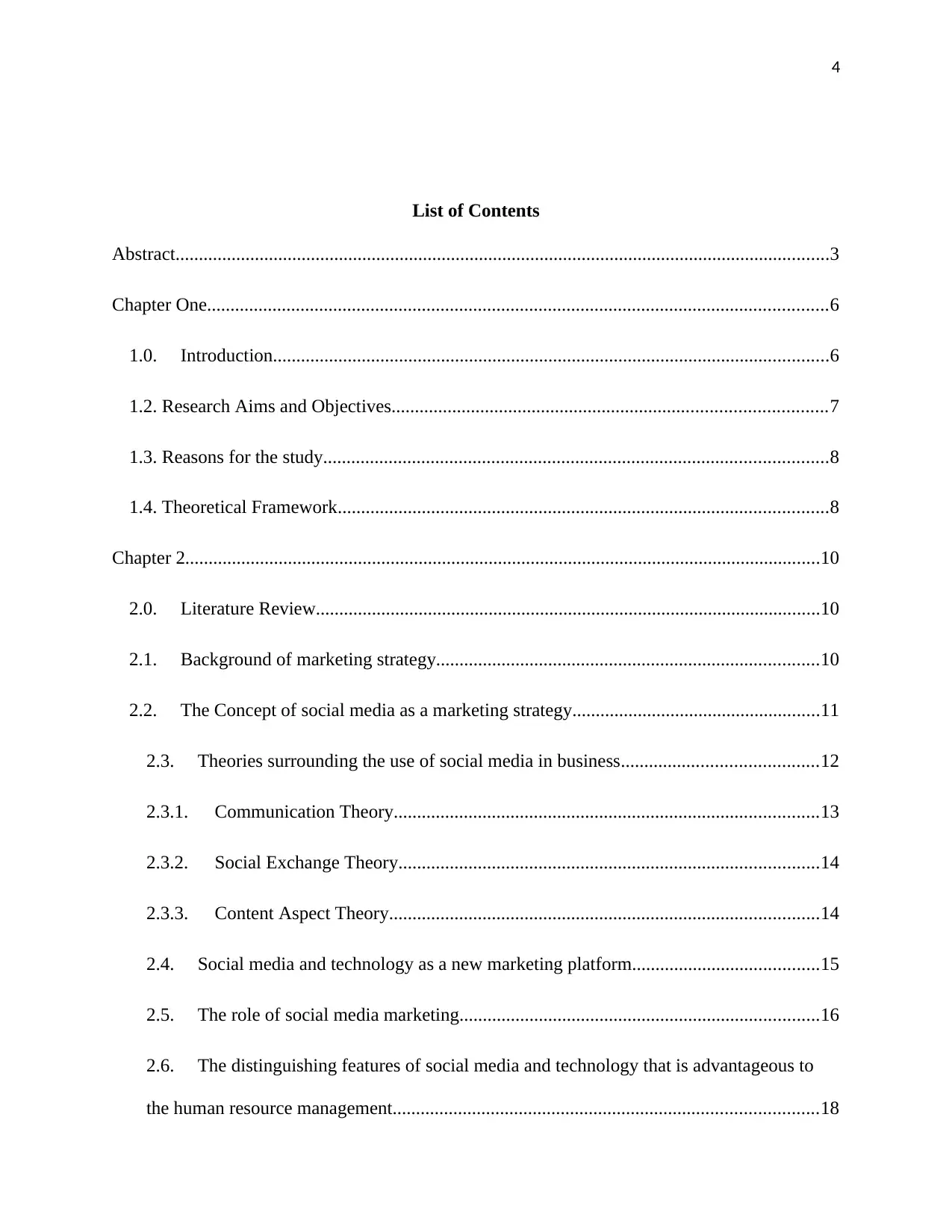
4
List of Contents
Abstract............................................................................................................................................3
Chapter One.....................................................................................................................................6
1.0. Introduction.......................................................................................................................6
1.2. Research Aims and Objectives.............................................................................................7
1.3. Reasons for the study............................................................................................................8
1.4. Theoretical Framework.........................................................................................................8
Chapter 2........................................................................................................................................10
2.0. Literature Review............................................................................................................10
2.1. Background of marketing strategy..................................................................................10
2.2. The Concept of social media as a marketing strategy.....................................................11
2.3. Theories surrounding the use of social media in business..........................................12
2.3.1. Communication Theory...........................................................................................13
2.3.2. Social Exchange Theory..........................................................................................14
2.3.3. Content Aspect Theory............................................................................................14
2.4. Social media and technology as a new marketing platform........................................15
2.5. The role of social media marketing.............................................................................16
2.6. The distinguishing features of social media and technology that is advantageous to
the human resource management...........................................................................................18
List of Contents
Abstract............................................................................................................................................3
Chapter One.....................................................................................................................................6
1.0. Introduction.......................................................................................................................6
1.2. Research Aims and Objectives.............................................................................................7
1.3. Reasons for the study............................................................................................................8
1.4. Theoretical Framework.........................................................................................................8
Chapter 2........................................................................................................................................10
2.0. Literature Review............................................................................................................10
2.1. Background of marketing strategy..................................................................................10
2.2. The Concept of social media as a marketing strategy.....................................................11
2.3. Theories surrounding the use of social media in business..........................................12
2.3.1. Communication Theory...........................................................................................13
2.3.2. Social Exchange Theory..........................................................................................14
2.3.3. Content Aspect Theory............................................................................................14
2.4. Social media and technology as a new marketing platform........................................15
2.5. The role of social media marketing.............................................................................16
2.6. The distinguishing features of social media and technology that is advantageous to
the human resource management...........................................................................................18
Paraphrase This Document
Need a fresh take? Get an instant paraphrase of this document with our AI Paraphraser
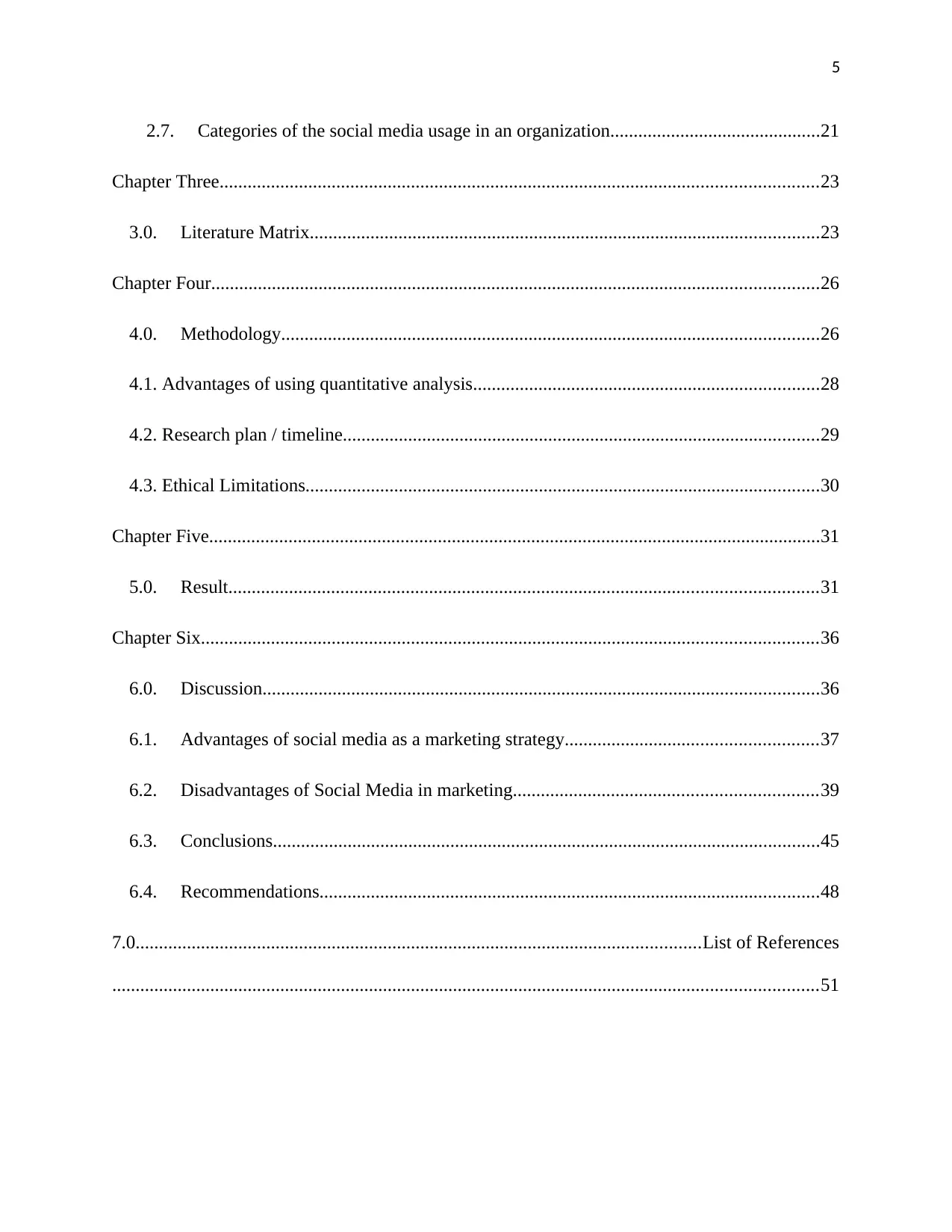
5
2.7. Categories of the social media usage in an organization.............................................21
Chapter Three................................................................................................................................23
3.0. Literature Matrix.............................................................................................................23
Chapter Four..................................................................................................................................26
4.0. Methodology...................................................................................................................26
4.1. Advantages of using quantitative analysis..........................................................................28
4.2. Research plan / timeline......................................................................................................29
4.3. Ethical Limitations..............................................................................................................30
Chapter Five...................................................................................................................................31
5.0. Result..............................................................................................................................31
Chapter Six....................................................................................................................................36
6.0. Discussion.......................................................................................................................36
6.1. Advantages of social media as a marketing strategy......................................................37
6.2. Disadvantages of Social Media in marketing.................................................................39
6.3. Conclusions.....................................................................................................................45
6.4. Recommendations...........................................................................................................48
7.0.........................................................................................................................List of References
.......................................................................................................................................................51
2.7. Categories of the social media usage in an organization.............................................21
Chapter Three................................................................................................................................23
3.0. Literature Matrix.............................................................................................................23
Chapter Four..................................................................................................................................26
4.0. Methodology...................................................................................................................26
4.1. Advantages of using quantitative analysis..........................................................................28
4.2. Research plan / timeline......................................................................................................29
4.3. Ethical Limitations..............................................................................................................30
Chapter Five...................................................................................................................................31
5.0. Result..............................................................................................................................31
Chapter Six....................................................................................................................................36
6.0. Discussion.......................................................................................................................36
6.1. Advantages of social media as a marketing strategy......................................................37
6.2. Disadvantages of Social Media in marketing.................................................................39
6.3. Conclusions.....................................................................................................................45
6.4. Recommendations...........................................................................................................48
7.0.........................................................................................................................List of References
.......................................................................................................................................................51
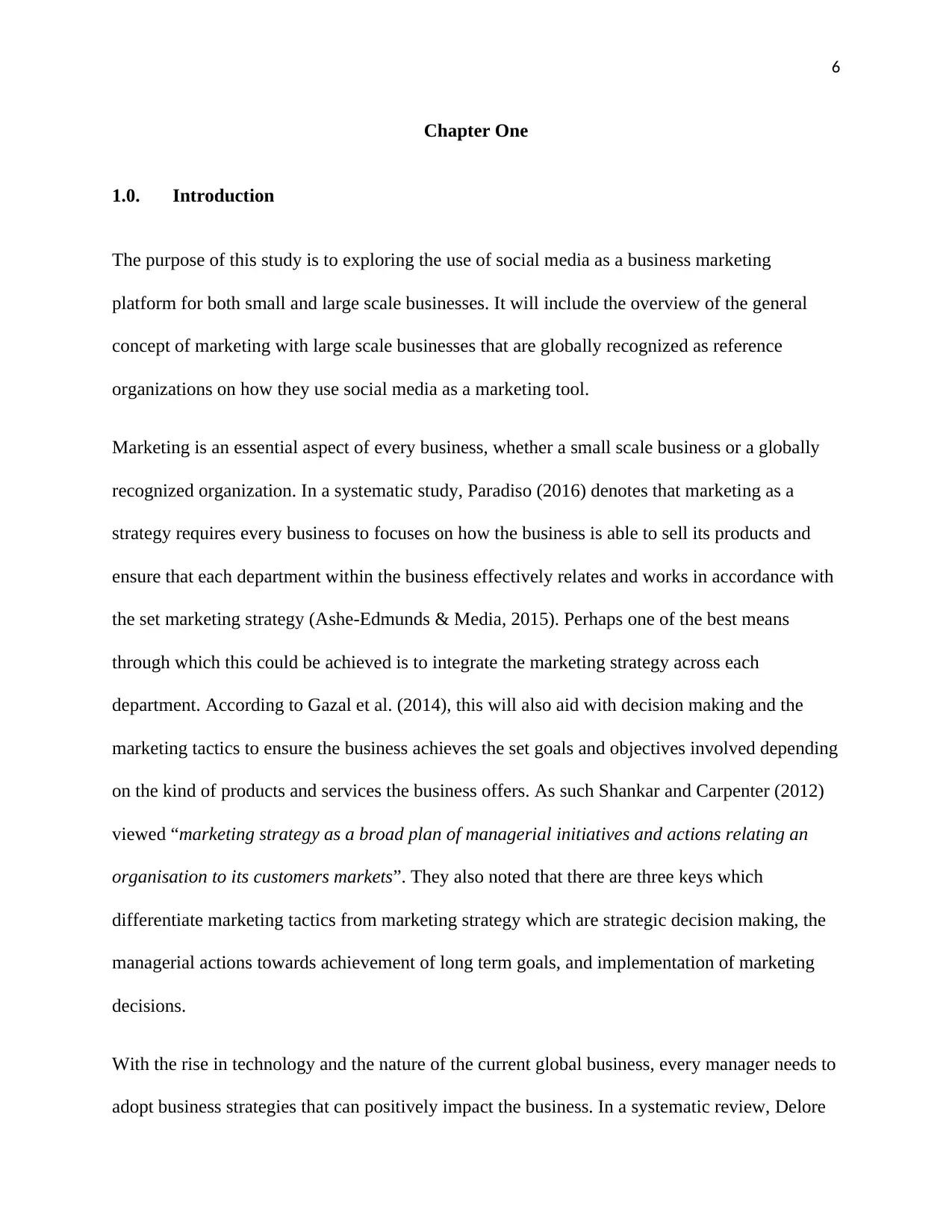
6
Chapter One
1.0. Introduction
The purpose of this study is to exploring the use of social media as a business marketing
platform for both small and large scale businesses. It will include the overview of the general
concept of marketing with large scale businesses that are globally recognized as reference
organizations on how they use social media as a marketing tool.
Marketing is an essential aspect of every business, whether a small scale business or a globally
recognized organization. In a systematic study, Paradiso (2016) denotes that marketing as a
strategy requires every business to focuses on how the business is able to sell its products and
ensure that each department within the business effectively relates and works in accordance with
the set marketing strategy (Ashe-Edmunds & Media, 2015). Perhaps one of the best means
through which this could be achieved is to integrate the marketing strategy across each
department. According to Gazal et al. (2014), this will also aid with decision making and the
marketing tactics to ensure the business achieves the set goals and objectives involved depending
on the kind of products and services the business offers. As such Shankar and Carpenter (2012)
viewed “marketing strategy as a broad plan of managerial initiatives and actions relating an
organisation to its customers markets”. They also noted that there are three keys which
differentiate marketing tactics from marketing strategy which are strategic decision making, the
managerial actions towards achievement of long term goals, and implementation of marketing
decisions.
With the rise in technology and the nature of the current global business, every manager needs to
adopt business strategies that can positively impact the business. In a systematic review, Delore
Chapter One
1.0. Introduction
The purpose of this study is to exploring the use of social media as a business marketing
platform for both small and large scale businesses. It will include the overview of the general
concept of marketing with large scale businesses that are globally recognized as reference
organizations on how they use social media as a marketing tool.
Marketing is an essential aspect of every business, whether a small scale business or a globally
recognized organization. In a systematic study, Paradiso (2016) denotes that marketing as a
strategy requires every business to focuses on how the business is able to sell its products and
ensure that each department within the business effectively relates and works in accordance with
the set marketing strategy (Ashe-Edmunds & Media, 2015). Perhaps one of the best means
through which this could be achieved is to integrate the marketing strategy across each
department. According to Gazal et al. (2014), this will also aid with decision making and the
marketing tactics to ensure the business achieves the set goals and objectives involved depending
on the kind of products and services the business offers. As such Shankar and Carpenter (2012)
viewed “marketing strategy as a broad plan of managerial initiatives and actions relating an
organisation to its customers markets”. They also noted that there are three keys which
differentiate marketing tactics from marketing strategy which are strategic decision making, the
managerial actions towards achievement of long term goals, and implementation of marketing
decisions.
With the rise in technology and the nature of the current global business, every manager needs to
adopt business strategies that can positively impact the business. In a systematic review, Delore
⊘ This is a preview!⊘
Do you want full access?
Subscribe today to unlock all pages.

Trusted by 1+ million students worldwide
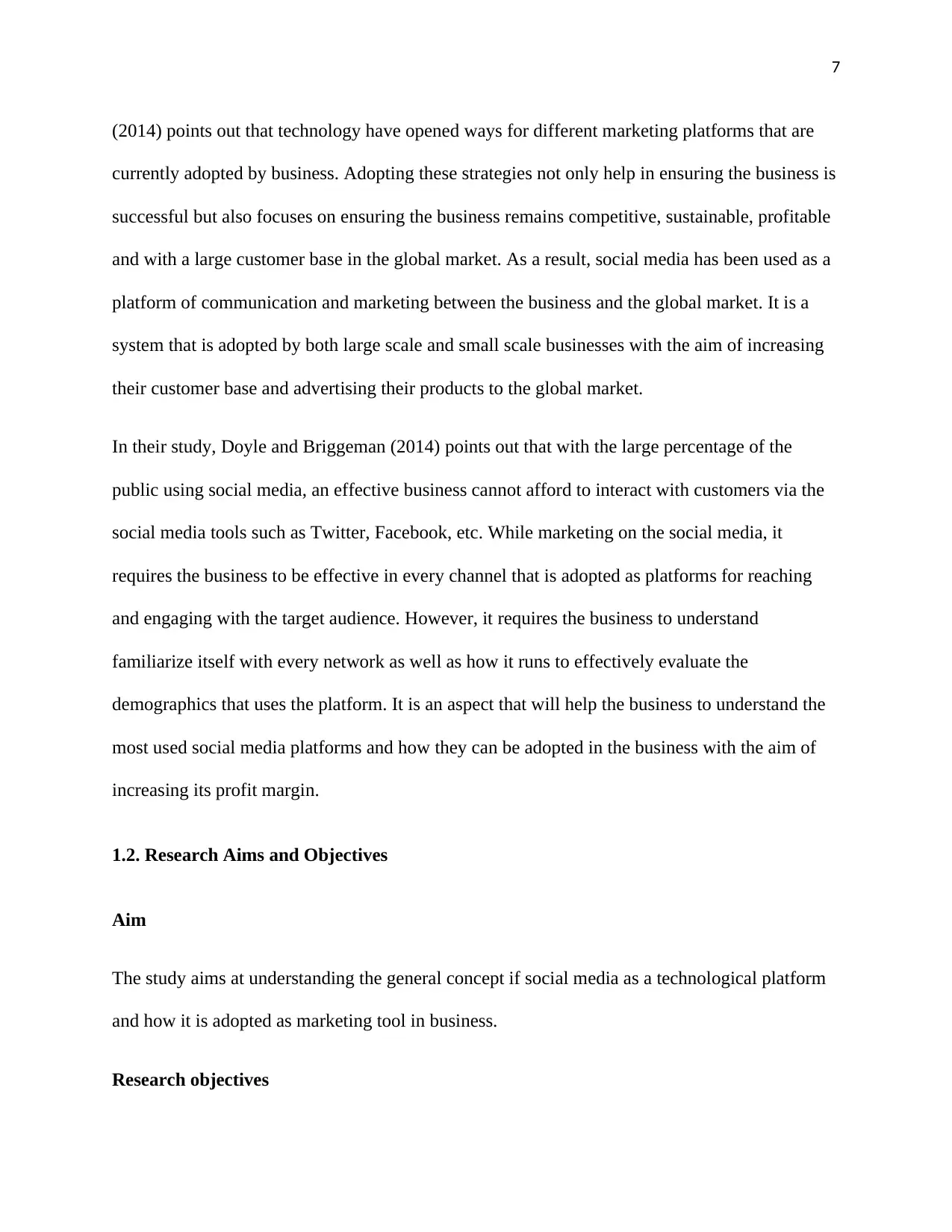
7
(2014) points out that technology have opened ways for different marketing platforms that are
currently adopted by business. Adopting these strategies not only help in ensuring the business is
successful but also focuses on ensuring the business remains competitive, sustainable, profitable
and with a large customer base in the global market. As a result, social media has been used as a
platform of communication and marketing between the business and the global market. It is a
system that is adopted by both large scale and small scale businesses with the aim of increasing
their customer base and advertising their products to the global market.
In their study, Doyle and Briggeman (2014) points out that with the large percentage of the
public using social media, an effective business cannot afford to interact with customers via the
social media tools such as Twitter, Facebook, etc. While marketing on the social media, it
requires the business to be effective in every channel that is adopted as platforms for reaching
and engaging with the target audience. However, it requires the business to understand
familiarize itself with every network as well as how it runs to effectively evaluate the
demographics that uses the platform. It is an aspect that will help the business to understand the
most used social media platforms and how they can be adopted in the business with the aim of
increasing its profit margin.
1.2. Research Aims and Objectives
Aim
The study aims at understanding the general concept if social media as a technological platform
and how it is adopted as marketing tool in business.
Research objectives
(2014) points out that technology have opened ways for different marketing platforms that are
currently adopted by business. Adopting these strategies not only help in ensuring the business is
successful but also focuses on ensuring the business remains competitive, sustainable, profitable
and with a large customer base in the global market. As a result, social media has been used as a
platform of communication and marketing between the business and the global market. It is a
system that is adopted by both large scale and small scale businesses with the aim of increasing
their customer base and advertising their products to the global market.
In their study, Doyle and Briggeman (2014) points out that with the large percentage of the
public using social media, an effective business cannot afford to interact with customers via the
social media tools such as Twitter, Facebook, etc. While marketing on the social media, it
requires the business to be effective in every channel that is adopted as platforms for reaching
and engaging with the target audience. However, it requires the business to understand
familiarize itself with every network as well as how it runs to effectively evaluate the
demographics that uses the platform. It is an aspect that will help the business to understand the
most used social media platforms and how they can be adopted in the business with the aim of
increasing its profit margin.
1.2. Research Aims and Objectives
Aim
The study aims at understanding the general concept if social media as a technological platform
and how it is adopted as marketing tool in business.
Research objectives
Paraphrase This Document
Need a fresh take? Get an instant paraphrase of this document with our AI Paraphraser
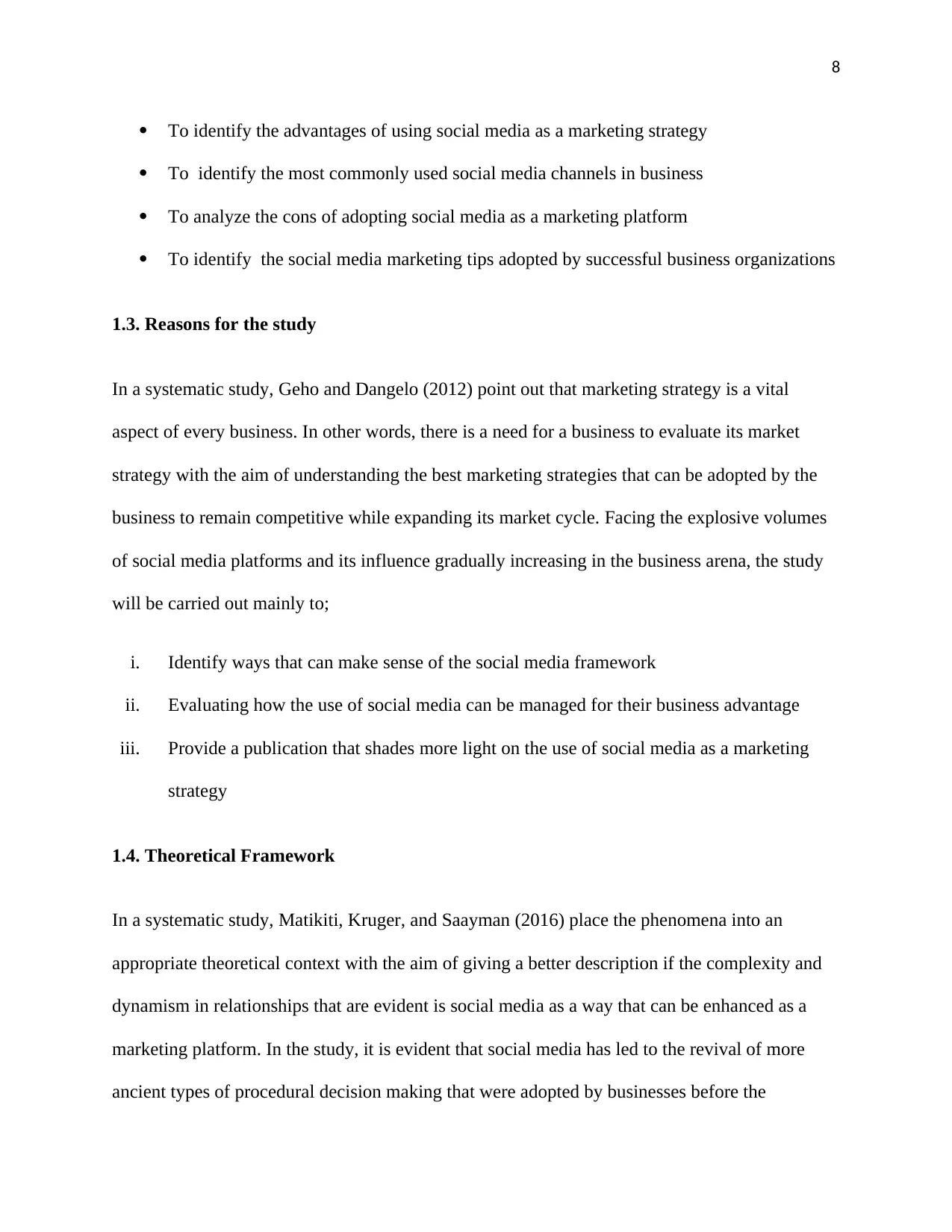
8
To identify the advantages of using social media as a marketing strategy
To identify the most commonly used social media channels in business
To analyze the cons of adopting social media as a marketing platform
To identify the social media marketing tips adopted by successful business organizations
1.3. Reasons for the study
In a systematic study, Geho and Dangelo (2012) point out that marketing strategy is a vital
aspect of every business. In other words, there is a need for a business to evaluate its market
strategy with the aim of understanding the best marketing strategies that can be adopted by the
business to remain competitive while expanding its market cycle. Facing the explosive volumes
of social media platforms and its influence gradually increasing in the business arena, the study
will be carried out mainly to;
i. Identify ways that can make sense of the social media framework
ii. Evaluating how the use of social media can be managed for their business advantage
iii. Provide a publication that shades more light on the use of social media as a marketing
strategy
1.4. Theoretical Framework
In a systematic study, Matikiti, Kruger, and Saayman (2016) place the phenomena into an
appropriate theoretical context with the aim of giving a better description if the complexity and
dynamism in relationships that are evident is social media as a way that can be enhanced as a
marketing platform. In the study, it is evident that social media has led to the revival of more
ancient types of procedural decision making that were adopted by businesses before the
To identify the advantages of using social media as a marketing strategy
To identify the most commonly used social media channels in business
To analyze the cons of adopting social media as a marketing platform
To identify the social media marketing tips adopted by successful business organizations
1.3. Reasons for the study
In a systematic study, Geho and Dangelo (2012) point out that marketing strategy is a vital
aspect of every business. In other words, there is a need for a business to evaluate its market
strategy with the aim of understanding the best marketing strategies that can be adopted by the
business to remain competitive while expanding its market cycle. Facing the explosive volumes
of social media platforms and its influence gradually increasing in the business arena, the study
will be carried out mainly to;
i. Identify ways that can make sense of the social media framework
ii. Evaluating how the use of social media can be managed for their business advantage
iii. Provide a publication that shades more light on the use of social media as a marketing
strategy
1.4. Theoretical Framework
In a systematic study, Matikiti, Kruger, and Saayman (2016) place the phenomena into an
appropriate theoretical context with the aim of giving a better description if the complexity and
dynamism in relationships that are evident is social media as a way that can be enhanced as a
marketing platform. In the study, it is evident that social media has led to the revival of more
ancient types of procedural decision making that were adopted by businesses before the
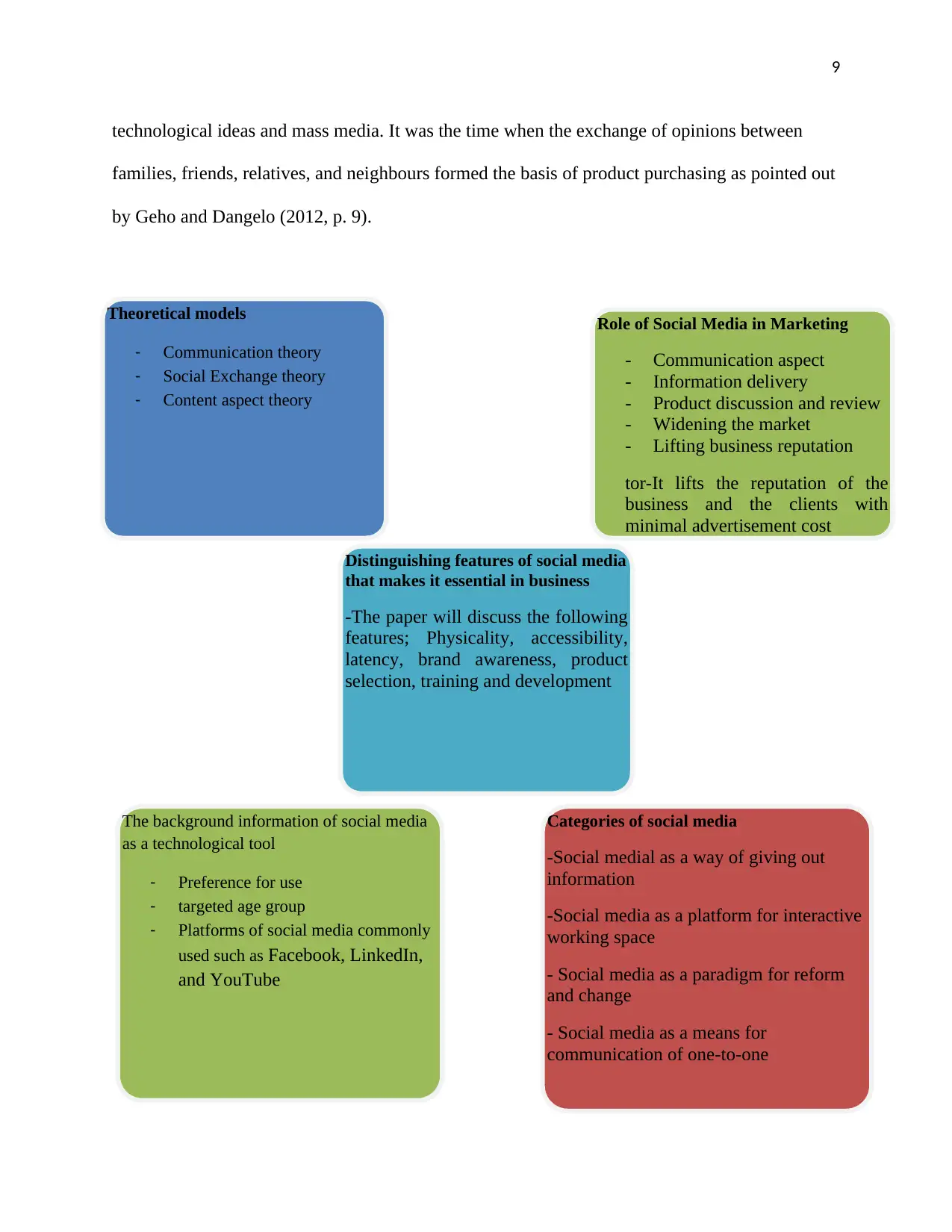
9
technological ideas and mass media. It was the time when the exchange of opinions between
families, friends, relatives, and neighbours formed the basis of product purchasing as pointed out
by Geho and Dangelo (2012, p. 9).
Theoretical models
- Communication theory
- Social Exchange theory
- Content aspect theory
Distinguishing features of social media
that makes it essential in business
-The paper will discuss the following
features; Physicality, accessibility,
latency, brand awareness, product
selection, training and development
Categories of social media
-Social medial as a way of giving out
information
-Social media as a platform for interactive
working space
- Social media as a paradigm for reform
and change
- Social media as a means for
communication of one-to-one
The background information of social media
as a technological tool
- Preference for use
- targeted age group
- Platforms of social media commonly
used such as Facebook, LinkedIn,
and YouTube
Role of Social Media in Marketing
- Communication aspect
- Information delivery
- Product discussion and review
- Widening the market
- Lifting business reputation
tor-It lifts the reputation of the
business and the clients with
minimal advertisement cost
technological ideas and mass media. It was the time when the exchange of opinions between
families, friends, relatives, and neighbours formed the basis of product purchasing as pointed out
by Geho and Dangelo (2012, p. 9).
Theoretical models
- Communication theory
- Social Exchange theory
- Content aspect theory
Distinguishing features of social media
that makes it essential in business
-The paper will discuss the following
features; Physicality, accessibility,
latency, brand awareness, product
selection, training and development
Categories of social media
-Social medial as a way of giving out
information
-Social media as a platform for interactive
working space
- Social media as a paradigm for reform
and change
- Social media as a means for
communication of one-to-one
The background information of social media
as a technological tool
- Preference for use
- targeted age group
- Platforms of social media commonly
used such as Facebook, LinkedIn,
and YouTube
Role of Social Media in Marketing
- Communication aspect
- Information delivery
- Product discussion and review
- Widening the market
- Lifting business reputation
tor-It lifts the reputation of the
business and the clients with
minimal advertisement cost
⊘ This is a preview!⊘
Do you want full access?
Subscribe today to unlock all pages.

Trusted by 1+ million students worldwide
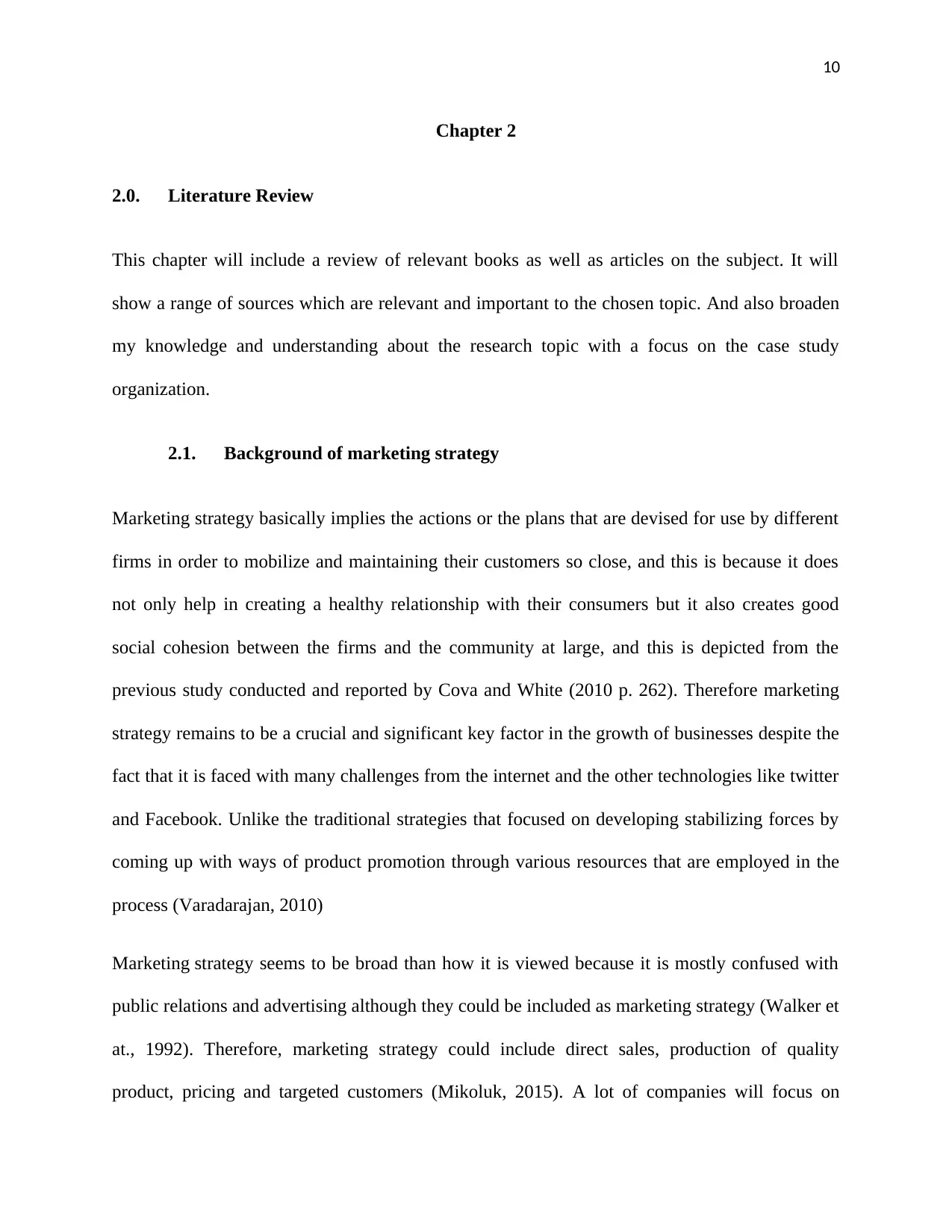
10
Chapter 2
2.0. Literature Review
This chapter will include a review of relevant books as well as articles on the subject. It will
show a range of sources which are relevant and important to the chosen topic. And also broaden
my knowledge and understanding about the research topic with a focus on the case study
organization.
2.1. Background of marketing strategy
Marketing strategy basically implies the actions or the plans that are devised for use by different
firms in order to mobilize and maintaining their customers so close, and this is because it does
not only help in creating a healthy relationship with their consumers but it also creates good
social cohesion between the firms and the community at large, and this is depicted from the
previous study conducted and reported by Cova and White (2010 p. 262). Therefore marketing
strategy remains to be a crucial and significant key factor in the growth of businesses despite the
fact that it is faced with many challenges from the internet and the other technologies like twitter
and Facebook. Unlike the traditional strategies that focused on developing stabilizing forces by
coming up with ways of product promotion through various resources that are employed in the
process (Varadarajan, 2010)
Marketing strategy seems to be broad than how it is viewed because it is mostly confused with
public relations and advertising although they could be included as marketing strategy (Walker et
at., 1992). Therefore, marketing strategy could include direct sales, production of quality
product, pricing and targeted customers (Mikoluk, 2015). A lot of companies will focus on
Chapter 2
2.0. Literature Review
This chapter will include a review of relevant books as well as articles on the subject. It will
show a range of sources which are relevant and important to the chosen topic. And also broaden
my knowledge and understanding about the research topic with a focus on the case study
organization.
2.1. Background of marketing strategy
Marketing strategy basically implies the actions or the plans that are devised for use by different
firms in order to mobilize and maintaining their customers so close, and this is because it does
not only help in creating a healthy relationship with their consumers but it also creates good
social cohesion between the firms and the community at large, and this is depicted from the
previous study conducted and reported by Cova and White (2010 p. 262). Therefore marketing
strategy remains to be a crucial and significant key factor in the growth of businesses despite the
fact that it is faced with many challenges from the internet and the other technologies like twitter
and Facebook. Unlike the traditional strategies that focused on developing stabilizing forces by
coming up with ways of product promotion through various resources that are employed in the
process (Varadarajan, 2010)
Marketing strategy seems to be broad than how it is viewed because it is mostly confused with
public relations and advertising although they could be included as marketing strategy (Walker et
at., 1992). Therefore, marketing strategy could include direct sales, production of quality
product, pricing and targeted customers (Mikoluk, 2015). A lot of companies will focus on
Paraphrase This Document
Need a fresh take? Get an instant paraphrase of this document with our AI Paraphraser
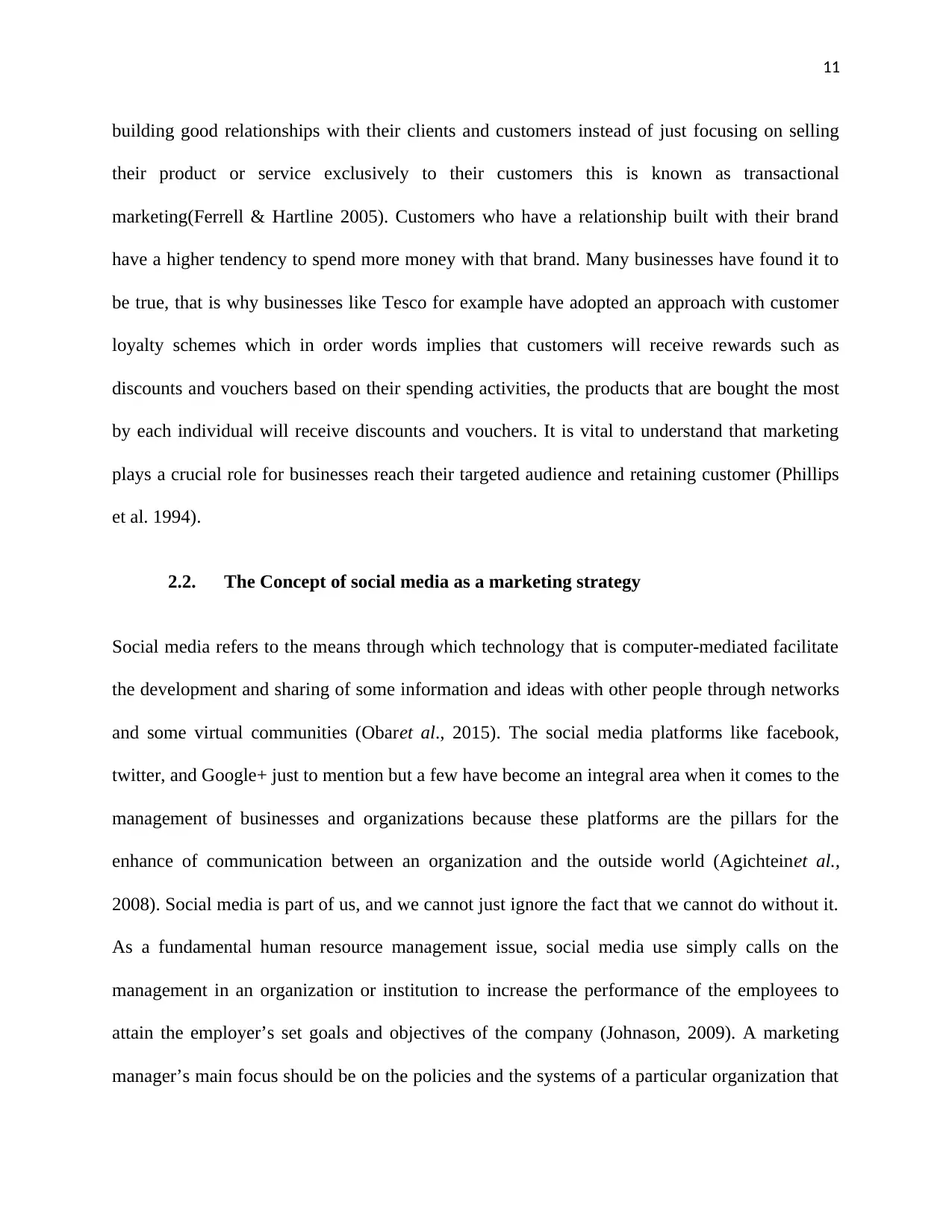
11
building good relationships with their clients and customers instead of just focusing on selling
their product or service exclusively to their customers this is known as transactional
marketing(Ferrell & Hartline 2005). Customers who have a relationship built with their brand
have a higher tendency to spend more money with that brand. Many businesses have found it to
be true, that is why businesses like Tesco for example have adopted an approach with customer
loyalty schemes which in order words implies that customers will receive rewards such as
discounts and vouchers based on their spending activities, the products that are bought the most
by each individual will receive discounts and vouchers. It is vital to understand that marketing
plays a crucial role for businesses reach their targeted audience and retaining customer (Phillips
et al. 1994).
2.2. The Concept of social media as a marketing strategy
Social media refers to the means through which technology that is computer-mediated facilitate
the development and sharing of some information and ideas with other people through networks
and some virtual communities (Obaret al., 2015). The social media platforms like facebook,
twitter, and Google+ just to mention but a few have become an integral area when it comes to the
management of businesses and organizations because these platforms are the pillars for the
enhance of communication between an organization and the outside world (Agichteinet al.,
2008). Social media is part of us, and we cannot just ignore the fact that we cannot do without it.
As a fundamental human resource management issue, social media use simply calls on the
management in an organization or institution to increase the performance of the employees to
attain the employer’s set goals and objectives of the company (Johnason, 2009). A marketing
manager’s main focus should be on the policies and the systems of a particular organization that
building good relationships with their clients and customers instead of just focusing on selling
their product or service exclusively to their customers this is known as transactional
marketing(Ferrell & Hartline 2005). Customers who have a relationship built with their brand
have a higher tendency to spend more money with that brand. Many businesses have found it to
be true, that is why businesses like Tesco for example have adopted an approach with customer
loyalty schemes which in order words implies that customers will receive rewards such as
discounts and vouchers based on their spending activities, the products that are bought the most
by each individual will receive discounts and vouchers. It is vital to understand that marketing
plays a crucial role for businesses reach their targeted audience and retaining customer (Phillips
et al. 1994).
2.2. The Concept of social media as a marketing strategy
Social media refers to the means through which technology that is computer-mediated facilitate
the development and sharing of some information and ideas with other people through networks
and some virtual communities (Obaret al., 2015). The social media platforms like facebook,
twitter, and Google+ just to mention but a few have become an integral area when it comes to the
management of businesses and organizations because these platforms are the pillars for the
enhance of communication between an organization and the outside world (Agichteinet al.,
2008). Social media is part of us, and we cannot just ignore the fact that we cannot do without it.
As a fundamental human resource management issue, social media use simply calls on the
management in an organization or institution to increase the performance of the employees to
attain the employer’s set goals and objectives of the company (Johnason, 2009). A marketing
manager’s main focus should be on the policies and the systems of a particular organization that
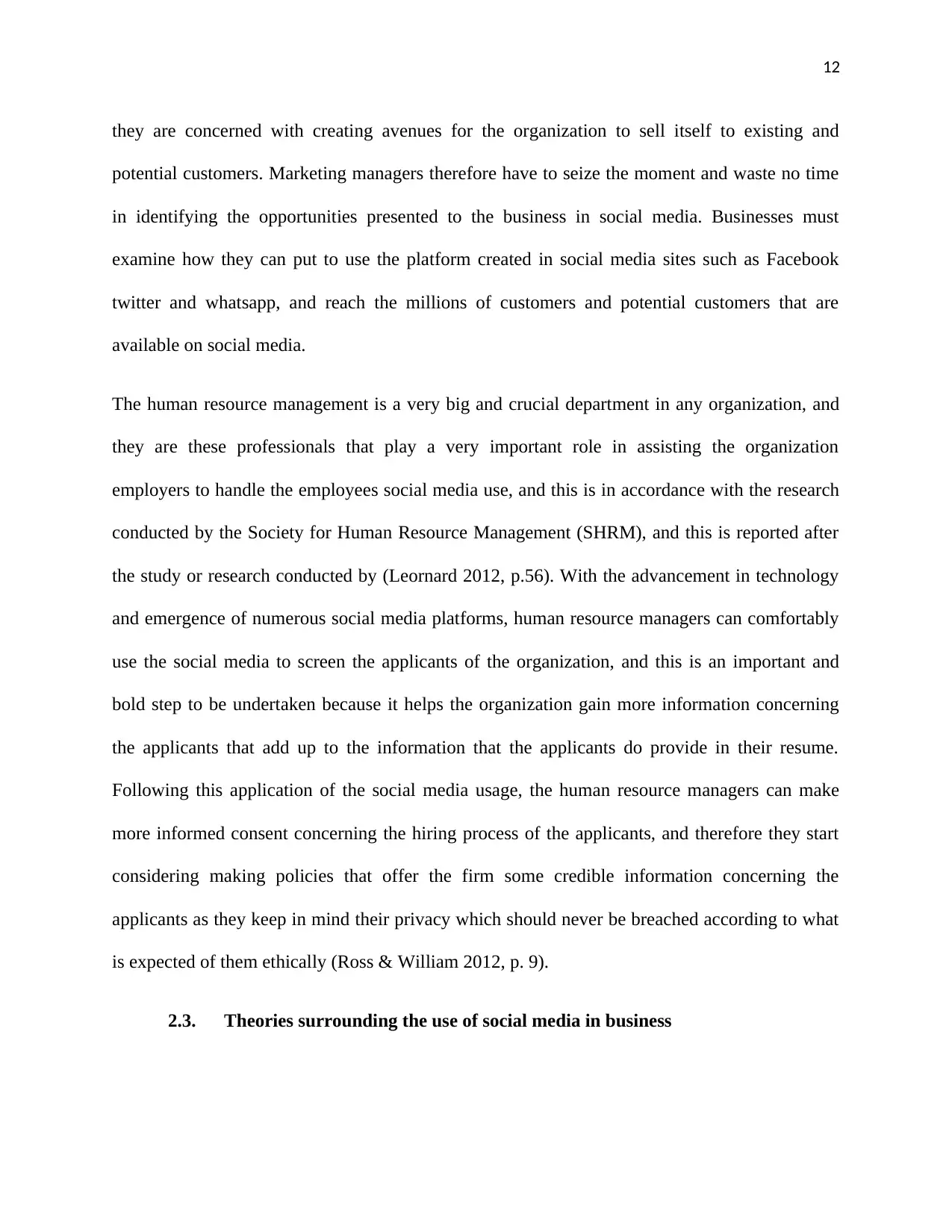
12
they are concerned with creating avenues for the organization to sell itself to existing and
potential customers. Marketing managers therefore have to seize the moment and waste no time
in identifying the opportunities presented to the business in social media. Businesses must
examine how they can put to use the platform created in social media sites such as Facebook
twitter and whatsapp, and reach the millions of customers and potential customers that are
available on social media.
The human resource management is a very big and crucial department in any organization, and
they are these professionals that play a very important role in assisting the organization
employers to handle the employees social media use, and this is in accordance with the research
conducted by the Society for Human Resource Management (SHRM), and this is reported after
the study or research conducted by (Leornard 2012, p.56). With the advancement in technology
and emergence of numerous social media platforms, human resource managers can comfortably
use the social media to screen the applicants of the organization, and this is an important and
bold step to be undertaken because it helps the organization gain more information concerning
the applicants that add up to the information that the applicants do provide in their resume.
Following this application of the social media usage, the human resource managers can make
more informed consent concerning the hiring process of the applicants, and therefore they start
considering making policies that offer the firm some credible information concerning the
applicants as they keep in mind their privacy which should never be breached according to what
is expected of them ethically (Ross & William 2012, p. 9).
2.3. Theories surrounding the use of social media in business
they are concerned with creating avenues for the organization to sell itself to existing and
potential customers. Marketing managers therefore have to seize the moment and waste no time
in identifying the opportunities presented to the business in social media. Businesses must
examine how they can put to use the platform created in social media sites such as Facebook
twitter and whatsapp, and reach the millions of customers and potential customers that are
available on social media.
The human resource management is a very big and crucial department in any organization, and
they are these professionals that play a very important role in assisting the organization
employers to handle the employees social media use, and this is in accordance with the research
conducted by the Society for Human Resource Management (SHRM), and this is reported after
the study or research conducted by (Leornard 2012, p.56). With the advancement in technology
and emergence of numerous social media platforms, human resource managers can comfortably
use the social media to screen the applicants of the organization, and this is an important and
bold step to be undertaken because it helps the organization gain more information concerning
the applicants that add up to the information that the applicants do provide in their resume.
Following this application of the social media usage, the human resource managers can make
more informed consent concerning the hiring process of the applicants, and therefore they start
considering making policies that offer the firm some credible information concerning the
applicants as they keep in mind their privacy which should never be breached according to what
is expected of them ethically (Ross & William 2012, p. 9).
2.3. Theories surrounding the use of social media in business
⊘ This is a preview!⊘
Do you want full access?
Subscribe today to unlock all pages.

Trusted by 1+ million students worldwide
1 out of 61
Your All-in-One AI-Powered Toolkit for Academic Success.
+13062052269
info@desklib.com
Available 24*7 on WhatsApp / Email
![[object Object]](/_next/static/media/star-bottom.7253800d.svg)
Unlock your academic potential
Copyright © 2020–2026 A2Z Services. All Rights Reserved. Developed and managed by ZUCOL.